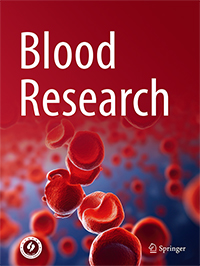Original Article
Korean J Hematol 2009; 44(4):
Published online December 30, 2009
https://doi.org/10.5045/kjh.2009.44.4.220
© The Korean Society of Hematology
면역능력이 저하된 소아에서 Multiplex RT-PCR에 의한 비인두 상주균 검출의 의의
김경희ㆍ신지혜ㆍ김선영
충남대학교 의과대학 소아과학교실
The Clinical Significance of Nasopharyngeal Carriages in Immunocompromised Children as Assessed
Background: The aim of this study was to determine the prevalence of asymptomatic nasopharyngeal carriages in immunocompromized children by using a multiplex reverse transcriptase-polymerase chain reaction (mRT-PCR) assay kit.
Methods: We obtained clinical samples by nasopharyngeal swabs from 42 patients with underlying immune deficiency from May 20, 2008 to May 22, 2008. The children were free from signs of respiratory tract infections at the time of sampling. Isolated cDNA was extracted and after this the DNA was examined using a multiplex primer set for pneumonial bacteria detection (SeeplexⰒ PneumoBacter ACE Detection, Seegene, Seoul, Korea). The amplified PCR products were separated on 2% agarose gels and stained with ethidium bromide and a screentape system (Lab901, Scottland, UK) and then they were compared. The nasopharyngeal swab culture was done simultaneously and this was compared with the results of mRT-PCR.
Results: A total of 42 patients (males: 24, females: 18) aged between 1.2 and 16.3 years (median: 9.2 years) were included in this study. The mRT-PCR detected bacteria (Streptococcus pneumoniae, Haemophilus influenzae, Chlamydia pneumoniae, and Bordetella pertussis) in 28 patients (66.6%). Of these 28 patients, 4 patients (14.3%) showed more than 2 bacteria: 2 patients were positive for two bacteria (S. pneumoniae and H. influenzae, H.influenzae and B. pertussis) and 2 patients were positive for three bacteria (S. pneumoniae, B. pertussis and C. pneumoniae, C. Pneumoniae, H. influenzae and B. pertussis). S. pneumoniae was cultured in one patient (2.4%).
Conclusions: The mRT-PCR is a sensitive tool for the detection of the asymptomatic nasopharyngeal carriages. The clinical significance of the bacteria detected in immunocompromized patients by mRT-PCR will need further evaluation. (Korean J Hematol 2009;44:220-226)
Keywords Nasopharynx, Immunocompromized patients, Reverse transcriptase polymerase chain reaction
Article
Original Article
Korean J Hematol 2009; 44(4): 220-226
Published online December 30, 2009 https://doi.org/10.5045/kjh.2009.44.4.220
Copyright © The Korean Society of Hematology.
면역능력이 저하된 소아에서 Multiplex RT-PCR에 의한 비인두 상주균 검출의 의의
김경희ㆍ신지혜ㆍ김선영
충남대학교 의과대학 소아과학교실
The Clinical Significance of Nasopharyngeal Carriages in Immunocompromised Children as Assessed
Kyung Hee Kim, Ji Hye Shin, Sun Young Kim
Department of Pediatrics, School of Medicine, Chungnam National University, Daejeon, Korea
Abstract
Background: The aim of this study was to determine the prevalence of asymptomatic nasopharyngeal carriages in immunocompromized children by using a multiplex reverse transcriptase-polymerase chain reaction (mRT-PCR) assay kit.
Methods: We obtained clinical samples by nasopharyngeal swabs from 42 patients with underlying immune deficiency from May 20, 2008 to May 22, 2008. The children were free from signs of respiratory tract infections at the time of sampling. Isolated cDNA was extracted and after this the DNA was examined using a multiplex primer set for pneumonial bacteria detection (SeeplexⰒ PneumoBacter ACE Detection, Seegene, Seoul, Korea). The amplified PCR products were separated on 2% agarose gels and stained with ethidium bromide and a screentape system (Lab901, Scottland, UK) and then they were compared. The nasopharyngeal swab culture was done simultaneously and this was compared with the results of mRT-PCR.
Results: A total of 42 patients (males: 24, females: 18) aged between 1.2 and 16.3 years (median: 9.2 years) were included in this study. The mRT-PCR detected bacteria (Streptococcus pneumoniae, Haemophilus influenzae, Chlamydia pneumoniae, and Bordetella pertussis) in 28 patients (66.6%). Of these 28 patients, 4 patients (14.3%) showed more than 2 bacteria: 2 patients were positive for two bacteria (S. pneumoniae and H. influenzae, H.influenzae and B. pertussis) and 2 patients were positive for three bacteria (S. pneumoniae, B. pertussis and C. pneumoniae, C. Pneumoniae, H. influenzae and B. pertussis). S. pneumoniae was cultured in one patient (2.4%).
Conclusions: The mRT-PCR is a sensitive tool for the detection of the asymptomatic nasopharyngeal carriages. The clinical significance of the bacteria detected in immunocompromized patients by mRT-PCR will need further evaluation. (Korean J Hematol 2009;44:220-226)
Keywords: Nasopharynx, Immunocompromized patients, Reverse transcriptase polymerase chain reaction





 PDF
PDF Standard view
Standard view Export citation
Export citation Share
Share  Previous Article
Previous Article



